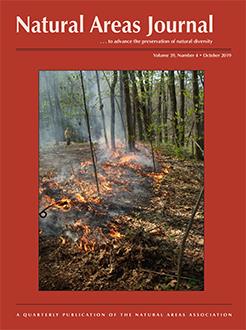Carbon (C) storage and accumulation in forests is of growing importance as climate change focuses our attention on rising greenhouse gas emissions. In 2012, we measured total ecosystem C pools (including live vegetation, dead wood, and soils) in two unmanaged, mixed-species stands in central Maine, USA. The stands are adjacent to one another and serve as references against which silvicultural treatments can be compared. The soil parent material of the stands was different (marine sediments versus glacial till), which provided an ideal opportunity to compare C stocks between these stands. We used tree ring analysis and repeated forest inventories to estimate tree and dead wood recruitment patterns and past disturbance severity. Site quality influenced C trajectories through its influence on tree species composition, which in turn strongly determined stand susceptibility to insect outbreaks. In 2012, total ecosystem C stocks were 196.3 ± 9.6 Mg ha–1 (mean ± SD) in the stand on soils derived from marine sediments and 247.0 ± 17.7 Mg ha–1 in the stand on soils derived from glacial till. Differences in average total ecosystem C stocks were primarily driven by the live tree C pool. Despite the occurrence of several partial disturbance events from 1954 to 2012, live tree C stocks increased over time in both stands. Average C accumulation in recruited dead wood was also positive, indicating that aboveground biomass served as a C sink. Our results can be used to inform decisions related to C objectives in unmanaged stands of similar species composition and soils.
BioOne.org will be down briefly for maintenance on 14 May 2025 between 18:00-22:00 Pacific Time US. We apologize for any inconvenience.
How to translate text using browser tools
22 November 2019
Site Quality, Disturbance, and Vegetation Effects on Carbon Storage and Accumulation in Old, Mixed-Species Stands in Central Maine, USA
Joshua J. Puhlick,
Shawn Fraver,
Ivan J. Fernandez,
Aaron Teets,
Aaron R. Weiskittel,
Laura S. Kenefic
ACCESS THE FULL ARTICLE

Natural Areas Journal
Vol. 39 • No. 4
September 2019
Vol. 39 • No. 4
September 2019
forest carbon accounting
soil parent material
tree mortality
tree recruitment
tree ring analysis




